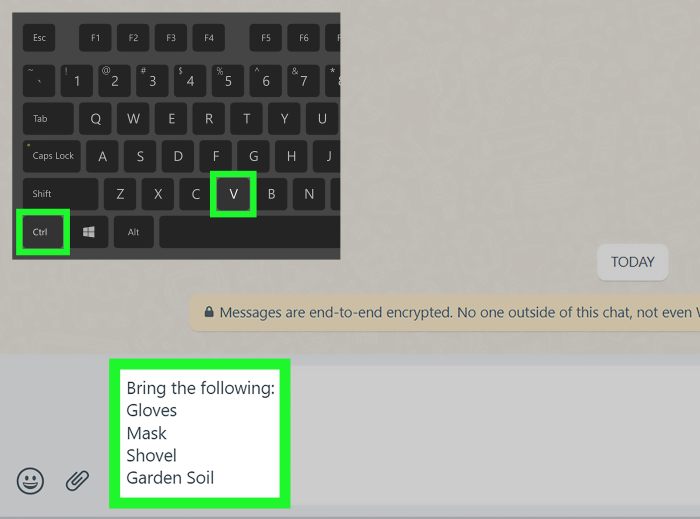Understanding WhatsApp Forwarding
WhatsApp forwarding is a feature that allows you to easily share messages, photos, videos, documents, and other content with multiple people at once. It’s a quick and convenient way to spread information, share updates, or simply connect with others.
Purpose of Forwarding Messages
Forwarding messages serves several purposes, making it a valuable tool for communication and information sharing.
- Sharing Information: Forwarding messages can be used to distribute news, announcements, or important updates to multiple people. This is especially useful for groups, families, or colleagues who need to stay informed.
- Sharing Updates: You can use forwarding to share personal updates, such as travel plans, event invitations, or simply what you’re up to, with multiple people at once.
- Sharing Funny Content: Forwarding is a popular way to share memes, jokes, and other humorous content with friends and family.
- Group Collaboration: Forwarding can facilitate collaboration by sharing ideas, documents, or task updates among team members.
Common Scenarios for Forwarding
There are many situations where forwarding messages comes in handy. Here are some common scenarios:
- Family Updates: Sharing photos, videos, or important announcements with family members who live far away.
- Group Projects: Sharing project updates, files, or meeting notes with team members.
- Social Events: Sharing invitations, event details, or RSVP requests with friends and acquaintances.
- Emergency Notifications: Quickly informing multiple people about a critical situation or an urgent need for assistance.
- Sharing Inspirational Quotes: Spreading positive messages or motivational quotes to uplift others.
Methods for Forwarding to Multiple Chats
Forwarding messages to multiple chats can be a time-saving feature, especially when you need to share information with several individuals or groups. WhatsApp offers distinct methods for forwarding messages to multiple individual chats and group chats. This section will detail the steps involved in each process, highlighting their limitations.
Forwarding to Individual Chats
Forwarding a message to multiple individual chats involves sending the same message to several different contacts. This can be useful for sharing updates, announcements, or reminders with multiple people.
- Open the message you want to forward: Locate the message you wish to share in your WhatsApp chat.
- Tap the forward arrow: In the top right corner of the message, you’ll find a forward arrow icon. Tap on it.
- Select multiple contacts: A list of your contacts will appear. Tap on the checkboxes next to the names of the contacts you want to forward the message to. You can select as many contacts as you need.
- Tap the forward button: Once you’ve selected all the desired contacts, tap the forward button at the bottom of the screen. The message will be sent to each of the selected contacts.
Forwarding to Group Chats
Forwarding messages to group chats is a straightforward process that allows you to share information with multiple people simultaneously. This method is particularly helpful for sharing news, updates, or announcements with a group of friends, family, or colleagues.
- Open the message you want to forward: Locate the message you wish to share in your WhatsApp chat.
- Tap the forward arrow: In the top right corner of the message, you’ll find a forward arrow icon. Tap on it.
- Select the group chat: A list of your chats will appear. Select the group chat you want to forward the message to.
- Tap the forward button: Once you’ve selected the group chat, tap the forward button at the bottom of the screen. The message will be sent to the group.
Limitations of Forwarding to Individual Chats and Groups
While forwarding messages to multiple chats offers convenience, it has certain limitations:
- Individual chat forwarding limits: WhatsApp imposes a limit on the number of individual chats you can forward a message to at once. This limit varies depending on your location and the version of WhatsApp you’re using. For instance, in some regions, you might be able to forward a message to a maximum of five individual chats at a time.
- Group chat forwarding limits: Similar to individual chat forwarding, WhatsApp also has limitations on the number of group chats you can forward a message to simultaneously. The exact limit can vary, but it’s generally lower than the individual chat forwarding limit.
- Privacy concerns: Forwarding messages to multiple chats can raise privacy concerns. If you’re forwarding a message that contains personal information or sensitive details, it’s essential to ensure you’re only sharing it with people who have the right to see it.
- Potential for spreading misinformation: Forwarding messages without verifying their accuracy can contribute to the spread of misinformation. It’s crucial to be cautious about the messages you forward and to double-check their authenticity before sharing them with others.
Alternatives to Forwarding
Forwarding messages on WhatsApp can be convenient, but it’s not always the most efficient or effective way to share information. There are several alternatives that offer more control, reach, and functionality.
These alternatives are especially useful when you want to share information with a larger group of people or need to organize and manage communication effectively.
Broadcasting
Broadcasting allows you to send the same message to multiple contacts without having to create a group. This is a good option when you want to reach a large number of people with a single message.
The benefits of using broadcasts include:
- Privacy: Only you can see the list of recipients, ensuring the privacy of your contacts.
- Convenience: You can send a single message to multiple contacts without having to create a group.
- Reach: You can reach a larger number of people with a single message.
However, there are also some drawbacks to consider:
- Limited Interaction: Unlike group chats, broadcasts don’t allow for real-time interaction. Recipients can’t reply directly to the message, and you won’t see their replies.
- Limited Features: Broadcast messages lack some features found in group chats, like the ability to share files or make voice or video calls.
Creating Polls
Polls are a useful tool for gathering feedback and making decisions within a group. WhatsApp allows you to create polls with up to 12 options. This feature can be helpful for:
- Decision Making: Polls can help groups make decisions by gathering opinions and preferences.
- Event Planning: Polls can be used to plan events by collecting feedback on dates, times, and locations.
- Gathering Feedback: Polls can be used to gather feedback on ideas, products, or services.
The benefits of using polls include:
- Engagement: Polls can encourage participation and engagement within a group.
- Efficiency: Polls can help groups make decisions more efficiently by gathering opinions quickly.
- Transparency: Polls provide a transparent way to gather and share feedback.
However, there are also some limitations to consider:
- Limited Options: Polls are limited to 12 options, which may not be sufficient for complex decisions.
- No Anonymity: Participants’ responses are visible to everyone in the group, which may discourage some from expressing their true opinions.
Potential Risks of Forwarding: Whatsapp Forward Message To Multiple Chats
Forwarding messages on WhatsApp can be a convenient way to share information with multiple people. However, it’s important to be aware of the potential risks associated with this practice.
Forwarding messages can contribute to the spread of misinformation, raise privacy concerns, and negatively impact user experience.
Misinformation and Hoaxes, Whatsapp forward message to multiple chats
Forwarding messages can contribute to the spread of misinformation and hoaxes. When you forward a message, you are essentially vouching for its authenticity, even if you haven’t verified it yourself. This can lead to the rapid dissemination of false information, which can have serious consequences.
- Unverified information: Many forwarded messages lack reliable sources or evidence. They may be based on rumors, speculation, or even outright lies.
- Emotional appeal: Misinformation often appeals to emotions, such as fear, anger, or outrage. This can make it more likely to be shared without critical thought.
- Lack of context: Forwarding messages out of context can distort the original meaning and lead to misinterpretations.
Privacy Concerns
Forwarding messages without the sender’s consent can raise privacy concerns. When you forward a message, you are sharing the sender’s information with others, even if it was intended for a private audience. This can be particularly problematic if the message contains sensitive information, such as personal details, financial data, or private conversations.
- Sharing personal information: Forwarding messages that contain personal details, such as phone numbers, addresses, or financial information, can expose the sender to potential risks.
- Breaching confidentiality: Forwarding private conversations or messages without the sender’s consent can be a breach of trust and confidentiality.
Impact on User Experience
Excessive forwarding can negatively impact the user experience for both senders and receivers.
- Spam and clutter: Constantly receiving forwarded messages can be overwhelming and contribute to a cluttered inbox.
- Reduced engagement: People may become less likely to engage with messages that are forwarded, as they may perceive them as less valuable or relevant.
Whatsapp forward message to multiple chats – Forwarding messages on WhatsApp can be a powerful tool for communication, but it’s essential to approach it with awareness and caution. By understanding the limitations, risks, and alternatives, you can utilize this feature to connect with others while maintaining ethical standards and avoiding the spread of misinformation. Remember, responsible communication is key to fostering healthy online interactions.
Sending the same WhatsApp message to multiple chats can be a lifesaver for group announcements or sharing funny memes, but it’s important to be mindful of who you’re sending it to. Just like how a judge recently dismissed a case against Twitter for content posted by ISIS, judge dismisses isis twitter case , we all have a responsibility to spread positive and relevant information.
So, before you hit that “forward” button, take a moment to consider if your message is truly worth sharing with everyone on your list.
 Standi Techno News
Standi Techno News

